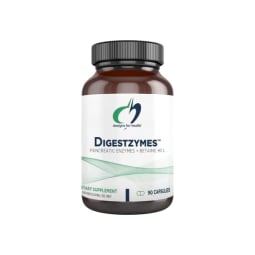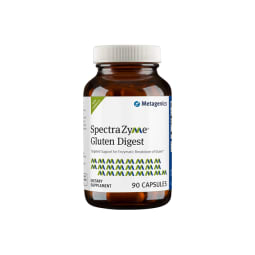mbg Associate Food & Health Editor
mbg Associate Food & Health Editor
Merrell Readman is the Associate Food & Health Editor at mindbodygreen. Readman is a Fordham University graduate with a degree in journalism and a minor in film and television. She has covered beauty, health, and well-being throughout her editorial career.

Image by Tatjana Zlatkovic / Stocksy
June 30, 2022
Digestion is a natural process that takes place within every body—but have you ever considered how your body actually breaks down food? One important player: digestive enzymes. These proteins are organically created within the pancreas (there are three main types: amylase, proteases, and lipase)—however, if your body isn’t making enough of them, it may be more difficult to digest food and absorb the essential nutrients your balanced diet provides.
Although a deficiency of digestive enzymes in the body is not entirely common, adding this supplement into your routine can make it easier for the body to break down food in general. But really, should everyone be taking digestive enzymes?
What do digestive enzymes do?
Before determining if you actually need a digestive enzyme supplement in your diet, it is important to know the role it plays within the body. “Digestive enzymes are proteins that break down food macromolecules into their smaller building blocks, in order to facilitate their absorption into the body through the gut lining,” digestive health expert Vincent Pedre, MD previously explained to mbg. “The body makes a variety of digestive enzymes, from amylase in saliva to proteases in the stomach to lipase in the small intestine.”
In simpler terms, the important macronutrients of proteins, fats and carbs all naturally get broken down and absorbed into the body. A digestive enzyme supplement helps support this function in the body, to help reap the important benefits of all the healthy foods you’re eating.
Who could benefit from taking digestive enzymes?
Anyone with suboptimal gut health may benefit from the addition of a digestive enzyme within their daily routine, to soothe bloating and discomfort and ensure you’re actually getting the nutritional benefits from the variety of foods you’re eating. “People with more bloating and gas, particularly if over the age of 50, are more likely to be low in stomach acid and be at risk for low production of enzymes,” Terry Wahls, MD once noted.
Now, without any further ado, here are the best digestive enzyme supplements out there—carefully selected by nutrition scientist and mindbodygreen’s VP of scientific affairs, Ashley Jordan Ferira, Ph.D., RDN.
Other signs you may benefit from a digestive enzyme:
- Lack of bowel movement regularity
- Frequent burping
- Feeling especially full after meals
How we chose.
We selected supplements that deliver an array of high-quality digestive enzymes to holistically support the digestion of carbohydrates, fibers, proteins, fats, and more.
Plant-origin when possible
While not all nutrients and targeted bioactives are plant-origin by design, our product selections leverage as many botanicals, herbs, and phytonutrients as possible.
In the product lineup chosen, you’ll find formulas with a spectrum of digestive enzymes, and many thoughtful formulas are bolstered with herbs, prebiotic fiber, and even probiotics.
Whether a capsule, powder, or chewable—we choose to elevate brands and products with high-quality active ingredients and a short, clean list of excipients with useful functions.
mbg’s picks for the best digestive enzymes of 2022:
Pros
- Versatile
- 31 powerhouse ingredients
- Prebiotics, probiotics, digestive enzymes
Dietary considerations: Vegan,, Non-GMO,, Gluten-free,, USDA-certified organic,, Dairy-free,, Soy-free
It’s always a good idea to sneak some extra veggies into your day where you can, and mbg’s organic veggies+ provides a blend of organic whole foods alongside enzymes to support smooth digestion while promoting a healthy gut microbiome.* Easy to blend into smoothies and a variety of other tasty recipes, this is a great way to get the digestive enzymes you need alongside pre- and probiotics.
Cons
- Not vegan-friendly
- Larger pill, may be difficult to swallow
Dietary considerations: Non-GMO,, Kosher,, Vegetarian
Considering a balanced diet contains an array of macronutrients, it only makes sense that your supplement should be able to account for this. This full-spectrum digestive enzyme offers support as your body breaks down proteins, fats, carbs, and fiber to streamline the process of getting the most nutrients out of your meals.
Best pancreatic enzymes with HCl & bile: Designs for Health Digestzymes™

Designs for Health Digestzymes™
VIEW ON Amazon | $40
Cons
- May cause upset stomach if taken without food
Dietary considerations: Non-GMO,, Vegetarian
Combining pancreatic enzymes alongside betaine HCI to support the digestion of your primary macronutrients, this supplement is great for those who experience gas and bloating following meals.* Non-GMO and stored in a glass bottle to preserve the product, this affordable option helps to naturally support the process of digestion.*
Best for gluten sensitivity: Metagenics SpectraZyme® Gluten Digest

Metagenics SpectraZyme® Gluten Digest
VIEW ON Amazon | $85
Pros
- Gentle on the stomach
- Promotes digestion of gluten*
Cons
- Not vegan-friendly
- 2 capsules dose
- Pricey
Dietary considerations: Non-GMO,, Gluten-free,, Vegetarian
If you struggle with a gluten sensitivity then you know the discomfort and bloating that can come from eating foods that don’t agree with you. Formulated with Tolerase G to help aid in the digestion of gluten, this supplement will support your body as you eat the foods you love.*
Cons
- Plastic bottle
- Short-term use only
Dietary considerations: Vegetarian
FODMAPS (fermentable oligosaccharides, disaccharides, monosaccharides, and polyols) are short chain carbohydrates that may be more difficult to digest for certain individuals, resulting in bloating. Designed for short-term use to help ease the digestion of FODMAP-rich foods, this supplement works to enhance the benefit of a low-FODMAP diet and help you and your gut feel your best.*
Pros
- Helps maintain a healthy inflammatory response*
Cons
- 3-capsule serving size
- Plastic bottle
Dietary considerations: Non-GMO,, Gluten-free,, Dairy-free,, Soy-free
The foods you eat can have an impact on the entirety of your body, including your muscles and bones. This supplement specifically works to support the muscular system, smoothing digestion and promoting muscle comfort, as well as joint and cartilage health.*
Cons
- The excipient list (aka “other” ingredients) contains rice, which can be starchy
Dietary considerations: Vegan,, Non-GMO,, Gluten-free,, Vegetarian
While a plant-based diet is undeniably good for the body, certain veggies may be more difficult to break down, and it’s here that a digestive enzyme becomes useful. This gentle vegan formula works with your body to support the digestive tract so you can absorb all the nutrients from your balanced diet with optimal comfort.*
Pros
- Includes probiotic & digestive enzyme
- Provides well-rounded digestive balance*
Dietary considerations: Vegan,, Non-GMO,, Gluten-free,, USDA-certified organic,, Dairy-free,, Soy-free
Sometimes your gut may need a little extra help to feel it’s best, and calling in a probiotic alongside your digestive enzyme may be useful to optimize digestive health so your body can most effectively absorb nutrients. Featuring a probiotic packed with four targeted strains to fight bloat, this combination is the powerhouse duo your gut needs.*
Pros
- Prebiotics and probiotics
Cons
- Long list of excipients (aka “other” ingredients)
Dietary considerations: Vegan,, Non-GMO,, Gluten-free,, Dairy-free,, Soy-free
Adding a probiotic into your diet will naturally feed the good bacteria in your gut, and alongside digestive enzymes you can work towards optimal gut health.* These effective capsules contain two digestive enzymes and 15 billion CFU of probiotics to safely support your digestion.*
Pros
- Budget-friendly
- pH optimized enzyme
Cons
- Not vegan-friendly
- May cause stomach upset
Dietary considerations: Gluten-free,, Dairy-free,, Raw,, Vegetarian
Your wallet doesn’t have to hurt after purchasing a quality supplement that actually supports your health, and these raw enzyme capsules from Garden of Life help your body to digest difficult foods while making it easier to absorb their valuable nutrients.* pH optimized to boost the entirety of your digestive tract as you eat, this affordable supplement also fits well with a vegetarian diet.
Cons
- Plastic bottle
- 2-capsule serving size
- Adults only
Dietary considerations: Dairy-free,, Soy-free,, Vegetarian
For those who have difficulty swallowing, a chewable supplement, compared to a capsule, may be a better fit for getting the digestive enzymes you need. Taken before meals and offering a broad spectrum of digestive enzymes in one tablet, this supplement has anti-inflammatory benefits and makes breaking down food and nutrient absorption that much smoother.*
Dietary considerations: Non-GMO,, Soy-free,, Kosher
Children may also benefit from taking a digestive support supplement, and these papaya enzyme lozenges are not only great tasting, but particularly effective in providing the body with what it needs to experience smooth digestion.* Just make sure to take them after your meals.
When to take digestive enzymes.
Your bottle of digestive enzymes should include directions on when to take them to best reap the benefits, but remember that this supplement is intended to make the process of digestion that much smoother.* With that, taking them just before you eat your meal will set your body on the right track to break down food and adequately absorb the nutrients your meal provides.* Some brands, however, recommend taking your enzyme supplement with food or shortly after eating—it all comes down to which product you choose.
Digestive enzymes side effects.
As with any new supplement, staying aware of the side effects is essential, and it’s always worth checking in with your healthcare professional for guidance.
Depending on which product you choose, side effects for digestive enzymes may include:
- Stomach discomfort or cramping
- Queasiness
- Frequent bowel movements
The risk of these side effects is relatively minimal as long as you are taking the recommended dose of your specific supplement. Additionally, taking digestive enzymes with or directly before a meal can help mitigate any unwanted side effects, and choosing a gentle option may reduce the odds altogether.
The takeaway.
Healthy and smooth digestion is essential for feeling comfortable in your body and getting the most nutrients out of the foods you’re eating. If you regularly experience bloating, gas, and discomfort after eating, it may be worth considering a digestive enzyme for your mealtime routine to help your body break down food more effectively and support your overall well-being.*
While you can consume these enzymes from outside food sources, for those with suboptimal gut health, a digestive enzyme supplement can provide extra, targeted support.*
If you are pregnant, breastfeeding, or taking medications, consult your doctor before starting a supplement routine. It is always optimal to consult with a health care provider when considering what supplements are right for you.